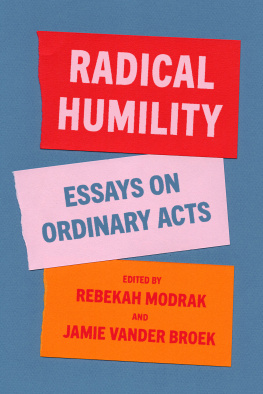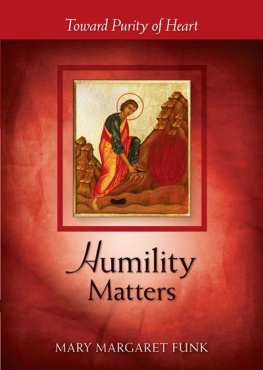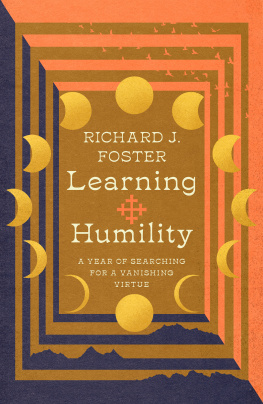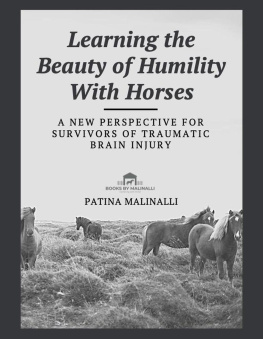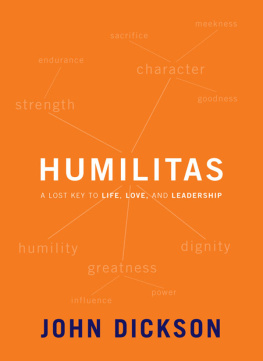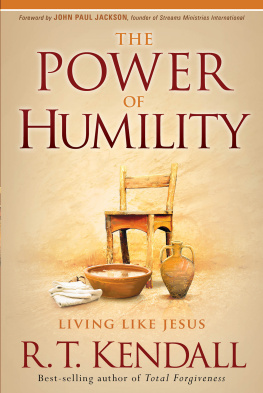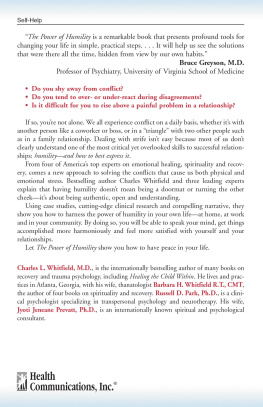Contents
Page List
Guide
RADICAL HUMILITY
ESSAYS ON ORDINARY ACTS
RADICAL HUMILITY
ESSAYS ON ORDINARY ACTS
EDITED BY
REBEKAH MODRAK
AND
JAMIE VANDER BROEK

Copyright 2021 by Rebekah Modrak and Jamie Vander Broek
All rights reserved. This book or any portion thereof may not be reproduced or used in any manner whatsoever without the express written permission of the publisher except for the use of brief quotations in a book review.
Printed in the United States of America
First edition 2021
1 2 3 4 5 6 7 8 9
ISBN: 978-1-948742-96-2
Belt Publishing
5322 Fleet Avenue
Cleveland, Ohio 44105
www.beltpublishing.com
Cover by Ben Denzer
Book design by Meredith Pangrace
Illustrations by Nick Tobier
To Ottilie, Lucy, and Oscar, with our hope for the future.
Radical humility
Sarah Buss
Rebekah Modrak
Jennifer Cole Wright
Ruth Nicole Brown
Agnes Callard
Troy Jollimore
Charles M. Blow
Aaron Ahuvia and Jeremy Wood
Jamie Vander Broek
Kevin Hamilton
Richard C. Boothman
Eranda Jayawickreme
Melissa Koenig and Valerie Tiberius
Lynette Clemetson
Gilbert B. Rodman
Ami Walsh
Mickey Duzyj
Nadia Danienta and Aric Rindfleisch
Russell Belk
Tyler Denmead
Kevin Em
AN INTRODUCTION
Sarah Buss
T his collection began with the summer residency featured in the first essay. In July 2016 Rebekah Modrak left behind a world permeated with the value of self-promotion, to live among people whose habits of mind and deed directed their attentionand the attention of othersaway from themselves. There, in Aurora, Nebraska, she observed humility as a way of life.
What, exactly, did she observe? The essays that follow are a response to Modraks decision to invite people from a wide range of backgrounds to reflect on the nature and value of humility. Perhaps more importantly, most of these reflections describe specific contexts in which humility has played a key role. These contexts include hospitals, universities, and libraries; restaurants and restaurant kitchens; makers spaces and the spaces where athletes compete. They include friendships and the relationships between the frail and the healthy.
The variety of styles and the many different perspectives represented in these essays provide us with an antidote to any temptation we may have to make easy generalizations about the issues they address. Nonetheless, several themes emerge. In this introduction, I will call attention to a few of these themes, hoping that the readers will treat my brief observations as a prompt to draw their own connections and raise their own questions.
Humility is commonly contrasted with arrogance and pride. Arrogance is clearly a vice: the vice of assuming that one is superior to, and more important than, others. But what about pride? We encourage our children to be proud of themselves; defenders of equal rights often march under the banner of pride. In short, as several of the essays suggest, though a person cannot be both arrogant and humble, there is an important sense in which someone can be proud and humble at the same time.
This point is closely related to another: humility is not servility. To refrain from regarding oneself as superior to others is not to regard oneself as inferior. As Aaron Ahuvia and Jeremy Wood note, hierarchical societies value this deferential stanceat least in those who are at a lower level in the hierarchy. But we no longer see things this way. We do not think that this sort of deference is compatible with self-respect. It is widely assumed that if we value ourselves properly, we will interact with one another as equals.
This having been said, it would be a mistake to conclude that the disposition to defer to others is no longer one of the things we value in valuing humility. As several of the essays in this collection stress, to be humble is to appreciate ones fallibility. It is to know how little one knows. Indeed, as Troy Jollimore and Charles M. Blow remind us, humility involves acknowledging that some people are ones superiors in knowledge, given their experience and training. And it involves being disposed to learn what one can from these people. To be humble is to appreciate that when one disagrees with someone, it may not be this other person who is confused and mistaken. We need not deny that all people are created equal in order to concede that some peoples opinions have more to be said for them than others.
I mentioned experience as well as training. A humble person is not only prepared to learn from those with greater expertise. She is also deeply aware of how much can be gained by engaging nonexperts with an open mind and heart. As both Jollimore and Agnes Callard explain, it was this awareness that drove Socrates to seek out others in his quest for wisdom. In different ways, Eranda Jayawickreme and Melissa Koenig and Valerie Tiberius also call our attention to what we miss, and what significant benefits we foregowhether in business or in personal relationswhen we presume to know more than the people with whom we interact. Koenig and Tiberius draw a further connection between being open to learning from others and being less prone to treating them in ways that do more harm than good. When, for example, we do not seriously account for the fact that someones cares and concerns may be very different (and no less important) than our own, even our benevolent impulses can have harmful effects on those we are trying to help.
Of course, sometimes other people need to learn from us. And having the courage of ones convictions is just as important as being prepared to modify ones convictions in response to ones interactions with others. The philosopher Friedrich Nietzsche points out that few great deeds would be done, and few great works of art would be created, if people never closed their minds to the many reasons they have for questioning the value of what they are doing. Rick Boothman illustrates this point with his story of howin the face of powerful oppositionhe quit his job as a lawyer defending hospitals against malpractice suits, convincing a major hospital system to incorporate greater humility into the practice of medicine. And Callard stresses the need to combine humility with self-confidence when she notes that the person who is eager to learn from others must rely on the fact that these others have confidence in their own beliefs. In order to expand our knowledge, we must start somewhere. A situation in which everyone suspends her judgments about everything is at least as bad as a situation in which everyone is confident that she has no reason to question her convictions.
Though, as Koenig and Tiberius stress, many of our mistakes reflect the fact that we lack adequate concern for the perspectives of others, our failures can yield lessons in humility even when they cannot be attributed to any such insensitivity. When we fail to achieve our goals, we are often prompted to reconsider how our interests and concerns relate to the interests and concerns of others. In his essay Mickey Duzyj recounts the trajectories of athletes whose public failuresand even humiliationsprompted them to reject their self-involved ambitions and devote themselves to improving the lives of others. As many studies have shown, people who thus redirect their attention and efforts usually end up living far more fulfilling lives as a result.

